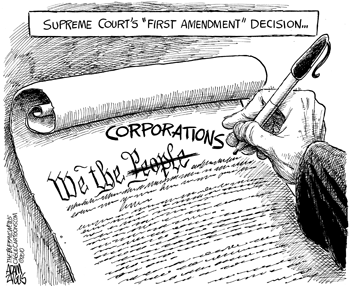(10 am. – promoted by ek hornbeck)
Cross posted from The Stars Hollow Gazette
 It has been four years since the Supreme Court handed down it ruling in Citizens United v. Federal Election Commission holding that the First Amendment prohibits the government from restricting political independent expenditures by corporations, associations, or labor unions.
It has been four years since the Supreme Court handed down it ruling in Citizens United v. Federal Election Commission holding that the First Amendment prohibits the government from restricting political independent expenditures by corporations, associations, or labor unions.
Ian Vandewalker, counsel for the Democracy Program at the Brennan Center for Justice at NYU School of Law, explains the consequences he ruling has made of unlimited spending by corporations and unions, leading to an explosion of outside money in elections.
Certainly, big donors seem to believe their donations can buy influence. Thanks to Citizens United, outside spending skyrocketed in 2012 to more than $1 billion, including $400 million from dark money groups that don’t disclose their donors.
Legislators targeted by the outside negative ads are concerned. Some have used the specter of massive outside spending to argue that they need more direct contributions for their re-election campaigns in order to ‘weaken’ the influence of outside money. Eight states have increased the dollar amounts that donors can give directly to candidates, and similar legislation has advanced in several others. Alabama eliminated its $500 limit on corporate donations, allowing corporations to give unlimited amounts of money directly to candidates. Limits in other states, like Florida, are now several times higher.
Now the same justices whose Citizens United ruling created the outside expenditure quandary are arguing that it necessitates weakening limits on direct contributions. In oral argument for McCutcheon v. FEC, a case challenging limits on the total amount individuals can donate directly to all federal candidates, the court’s conservative justices seem to contradict the reasoning they used to justify their 2010 decision. Justice Scalia said there is no real distinction between the gratitude a candidate would feel toward a contributor on the one hand and a major independent spender on the other. He added, “The thing is, you can’t give [unlimited contributions] to the Republican Party or the Democratic Party, but you can start your own PAC… . I’m not sure that that’s a benefit to our political system.”
There is movement toward removing big money from politics, as John Nichols of The Nation notes, and putting democracy back in the hands of the voters. There has been a movement to amend the constitution that is gaining ground:
Sixteen American states have formally demanded that Congress to recognize that the Constitution must be amended in order to re-establish the basic American premise that “money is property and not speech, and [that] the Congress of the United States, state legislatures and local legislative bodies should have the authority to regulate political contributions and expenditures…” [..]
Support for an amendment now stretches from coast to coast, with backing (in the form of legislative resolutions or statewide referendum results) from California, Colorado, Connecticut, Delaware, Hawaii, Illinois, Maine, Maryland, Massachusetts, Montana New Jersey, New Mexico, Oregon, Rhode Island, Vermont and West Virginia. The District of Columbia is also supportive of the move to amend, as are roughly 500 municipalities, from Liberty, Maine, to Los Angeles, California – where 77 percent of voters backed a May, 2013, referendum instructing elected representatives to seek an amendment establishing that “there should be limits on political campaign spending and that corporations should not have the constitutional rights of human beings.” [..]
The groundbreaking work by national groups such as Public Citizen, Common Cause, Free Speech for People and Move to Amend, in conjunction with grassroots coalitions that are now active from northern Alaska to the tip of the Florida Keys, is far more dramatic than most of the initiatives you’ll see from the Democratic or Republican parties-which don’t do much but fund-raise-and various and sundry groupings on the right and left. [..]
Free Speech for People highlights the fact that dozens of Republican legislators have backed calls for an amendment to overturn not just the Citizens United ruling but other barriers to the regulation of money in politics. With backing from third-party and independent legislators, as well, the passage of the state resolutions highlights what the group refers to as “a growing trans-partisan movement…calling for the US Supreme Court’s misguided decision in Citizens United v. FEC (2010) to be overturned, through one or more amendments to the US Constitution.”

1 comments
Author